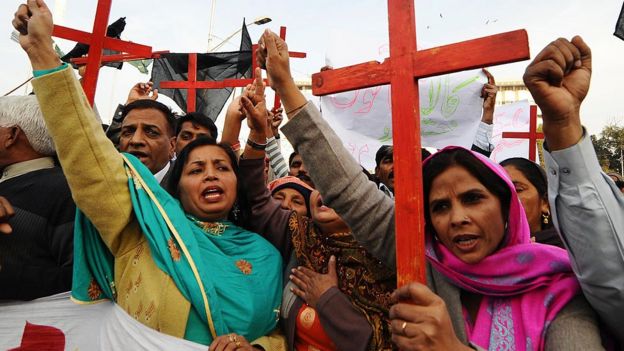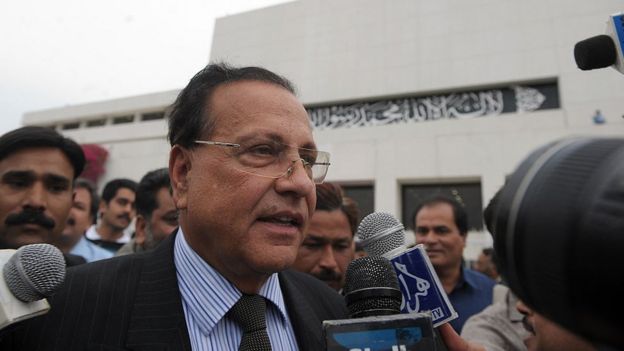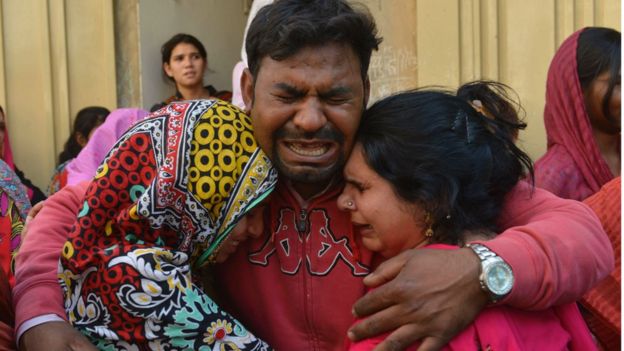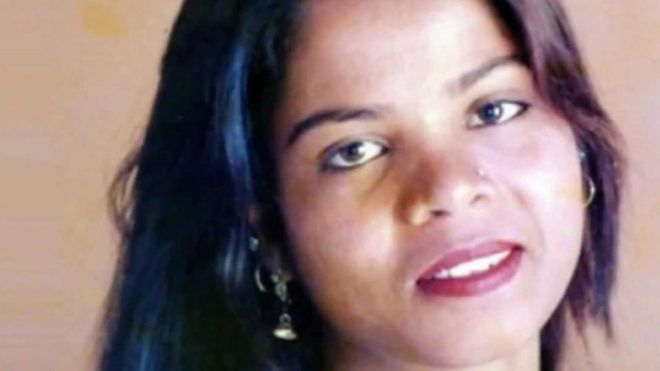As churches around the country prepare to celebrate the birth of Christ, with peace and goodwill toward men, spare a thought for those who must live out their faith in a foreign land.
This will be the seventh consecutive Christmas mother-of-five Asia Bibi will spend in solitary confinement within the Islamic Republic of Pakistan - a country that has what the United Nations describes as "one of the worst situations in the world for religious freedom".
A member of the Christian minority, just 1.6% of the population, 45-year-old Asia Bibi was jailed after being found guilty of breaching Pakistan's strict blasphemy laws.
Her case has provoked global protests, with supporters accusing the judiciary of fabricating the charge to persecute a Christian. There have been no fewer than three attempts at appealing against the verdict.
There's also been a direct intervention by Pope Francis, who received a delegation of family and friends at the Vatican. But still she languishes in a small cell as the world awaits a final decision from the Supreme Court in Lahore.
 ARIF ALI/AFP/GETTY IMAGES
ARIF ALI/AFP/GETTY IMAGES
"The case of Asia Bibi is precisely the reason why I continue to fight for religious minorities around the world," says crossbench peer Baroness Cox, who recently returned from visiting oppressed Christians in Nigeria.
"Only those of us in open and free societies can be a voice to the voiceless and Christmas is the perfect season for us to renew our appeal for humanity and tolerance."
The original incident, which occurred in June 2009, centred around Asia Bibi sharing a bowl of water with fellow workers in a field, about 30 miles (48km) from Lahore, where they were working as farm labourers.
It's alleged that an argument erupted after some of the women felt it was sacrilegious for Muslims to share the cup with a Christian. Within weeks, the allegations had escalated to the charge of blasphemy, with some fellow workers accusing her of insulting the Prophet Muhammad. She was arrested and imprisoned.
Despite reports of inconsistent witness testimony and fragmentary evidence, she was found guilty in November 2010. Large crowds gathered to celebrate her sentencing, and there soon followed a trail of death and destruction.
 FAROOQ NAEEM/AFP/GETTY IMAGES
FAROOQ NAEEM/AFP/GETTY IMAGES
A month after sentencing, Asia Bibi was visited by the Governor of Punjab, Salman Taseer. He emerged from jail and stated that the blasphemy laws had been misused and wrongly applied in her case. Within days, he was murdered by his bodyguard, Mumtaz Qadri.
Two months later, in March 2011, the Federal Minister for Minorities Affairs, Shahbaz Bhatti - the only Christian in the Pakistan cabinet - criticised the country's blasphemy laws as being open to abuse and manipulation.
After leaving his mother's house, his car was sprayed with bullets: a second assassination in a matter of weeks and both apparently linked to the case of Asia Bibi.
Beyond the application of blasphemy laws, 2016 has also witnessed the continued targeting of Christian minorities by militant groups in Pakistan.
The most severe attack was launched on Easter Sunday in Lahore. A large number of the Christians had chosen to visit a neighbourhood park following morning worship. Spirits were naturally high.
"Things were going well," said the Roman Catholic Archbishop of Lahore, the Most Reverend Sebastian Shaw, "but it was very cautious. A priest called us and told us that we must be alert all the time."
 AFP/GETTY IMAGES
AFP/GETTY IMAGES
As parents pushed their children on swings and enjoyed the company of friends, two suicide bombers entered the park. Within minutes, the hum of children's voices was overwhelmed by the sound of tragedy. More than 340 people were injured and 75 died. The vast majority were women and children.
"It was very difficult," said Archbishop Shaw, who rushed to several medical facilities where the injured had been taken. "Even in the corridors of the hospital, at the entrance [there were] so many people. It was very difficult to console people.
"I visited a lady. She came from Hyderabad. Her husband and two children were killed and another cousin was also killed. So the lady was totally out of her senses and didn't know what had happened."
Within hours a group affiliated to the Pakistan Taliban, Jamaat-ul-Ahrar, said it had carried out the bombing and was reported to have deliberately targeted Christians.
Ban Ki-moon, Secretary General of the United Nations, condemned the attack and urged the Pakistan government "to do its utmost to put in place protective measures to ensure the personal security of all individuals, including religious minority communities living in the country".
But Pakistan is not alone.
Earlier this month, an individual wearing a suicide vest attacked a Coptic Christian church in Cairo, during Sunday morning prayers. There are conflicting reports about whether this was a man or a woman.
But the effect was unequivocal: at least 25 people were killed and a further 45 injured. Orthodox Copts comprise just 10% of Egypt's 90 million people but are the Middle East's largest Christian community.
The latest attack followed complaints by Christians in the town of Minya, about 140 miles (225km) south of Cairo, where several buildings were burned after they were suspected of hosting prayer meetings.
Christian worship in countries such as Pakistan and Egypt remains the most dangerous practice and this year of horrifying attacks could yet end with further bloodshed.
If Asia Bibi's appeal is rejected by the Supreme Court, she will become the first woman in Pakistan to be executed for blasphemy. Christians throughout Pakistan are praying for a miracle this Christmas.


No comments:
Post a Comment